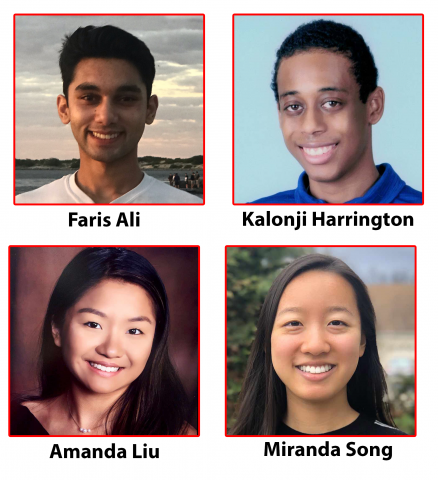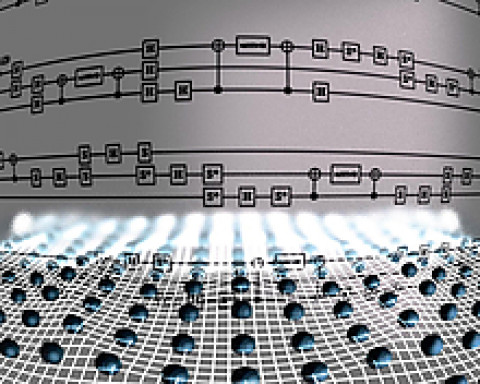Recent News & Accomplishments
2020
A University of Maryland expert in algorithms and high-performance computing has been funded by Google to develop computational techniques to improve contact tracing methods in the wake of COVID-19, research that could ultimately provide fundamental new insights into how epidemics can be controlled. Aravind Srinivasan , a Distinguished University Professor of computer science with an appointment in the University of Maryland Institute for Advanced Computer Studies , is one of the four principal investigators of the $140K project. He is joined by researchers from Princeton University and the... read more
Meet four impressive first-year CS Terps as they join UMD
Completing their high school careers and commencing their college ones while navigating the “new normal” of a global pandemic deserves credit on its own. But students in the University of Maryland’s incoming first-year class have accomplished much more. The group of around 4,300—including 500 computer science majors—is eager to meet new people, learn new things and start a new chapter. As they officially begin their time as Terps amid an unprecedented fall semester, meet four computer science majors below, virtually, of course: Faris Ali After graduating from Sunday school at his mosque,... read more
The University of Maryland’s undergraduate computer science program ranks No. 16 in the nation in the 2021 edition of U.S. News & World Report’s “Best Colleges.” The undergraduate program ranks 8th among public universities. In the computer science specialties, UMD ranks 9th in cybersecurity and 16th in artificial intelligence and data analytics/science. This is the first year the publication has ranked computer science undergraduate programs and specialties. “I am thrilled that we are ranked among the nation’s best computer science undergraduate programs,” said Matthias Zwicker, interim... read more
Professor Philip Resnik received an NSF grant from the Division of Information and Intelligent Systems for his project titled “ RI: Small: Modeling Co-Decisions: A Computational Framework Using Language and Metadata .” The funded project will develop computational models to help illuminate why and how individuals make similar or different choices, for example legislators in political contexts. The research focuses on going beyond previous factors like party and demographics to analyze similarities and differences in individuals' language, using techniques that identify interpretable, task-... read more
Computer scientists at the University of Maryland, College Park, are collaborating with child behavioral specialists at the University of Maryland, Baltimore, to improve telehealth services for children living in rural areas of the state, who are now even more isolated due to COVID-19. Aniket Bera , an assistant research professor in the University of Maryland Institute for Advanced Computer Studies (UMIACS), is principal investigator of the $90K award. Bera and Dinesh Manocha , the Paul Chrisman Iribe Professor of Computer Science, are working with psychiatric experts in Baltimore to develop... read more
Genomic sequencing data can often shed light on a wide array of scientific problems—from treating patients with heart disease and cancer to understanding how certain pathogens can affect plants and animals. Public repositories of genomic data are becoming more commonplace and are growing at an exponential rate. The National Center for Biotechnology Information (NCBI), for example, runs the Sequence Read Archive (SRA), a repository that holds raw scientific data for a vast number of scientific experiments conducted using high-throughput sequencing data. While repositories like the SRA are a... read more
Four Fellows of the Joint Center for Quantum Information and Computer Science (QuICS) have joined a national effort to develop quantum technologies that will usher in a new era of scientific discovery and innovation. Andrew Childs , a professor of computer science and the co-director of QuICS, and Xiaodi Wu , an assistant professor of computer science, will collaborate with scientists from federal labs, private industry and other universities as part of the new Quantum Science Center (QSC) that was announced on August 26. Chris Monroe, a Distinguished University Professor and the Bice Seci-... read more
Associate professor David Van Horn recently received the Most Influential Paper award at the 25th ACM SIGPLAN International Conference on Functional Programming (ICFP), for his paper titled “ Abstracting Abstract Machines .” Coauthored with Matt Might, director of the Hugh Kaul Precision Medicine Institute at the University of Alabama at Birmingham, the paper discusses a model of a computer system constructed to allow a detailed and precise analysis of how the computer system works. Van Horn’s paper, published in 2010, describes a derivational approach to abstract interpretation that yields... read more
The Department of Computer Science is pleased to welcome our new Victor Basili Fellow for Fall 2020: Michael Coblenz . The Victor Basili Postdoctoral Fellowship Program focuses on supporting young researchers doing work on methods to ensure that software applied to pressing societal problems is trustworthy, reliable, and correct. A PhD in computer science from Carnegie Mellon University, Coblenz’s dissertation focused on user-centered design methods for programming languages. He has created Obsidian, a new programming language for blockchain smart contracts, which integrates a strong, static... read more
Assistant Research Professor Aniket Bera and Paul Chrisman Iribe Professor of Computer Science, Dinesh Manocha recently received a grant from the UMD Brain and Behavior Initiative (BBI) for the project titled “Learning Age and Gender Adaptive Gait Motor Control-based Emotion Using Deep Neural Networks and Affective Modeling. ” The project seeks to develop automated AI-based techniques for perceiving human emotions based on kinematic and kinetic variables—that is, based on both the contextual and intrinsic qualities of human motion. The proposed research will examine the role of age and gender... read more









